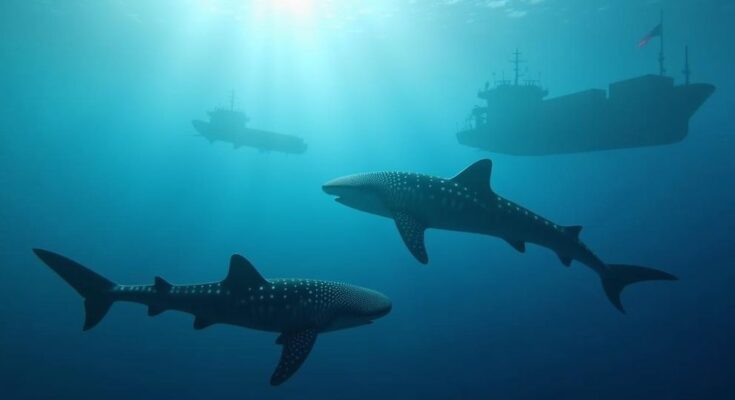According to a recent study published in *Nature Climate Change*, warming oceans could significantly increase the risk of whale shark collisions with large ships, projecting a 15,000-fold rise in such encounters by century’s end. Researchers predict that over 50% of core habitats could be lost under high emission scenarios, while sustainable practices could help mitigate these outcomes. The research emphasizes the need for integrated conservation efforts in light of these challenges.
A recent study published in Nature Climate Change raises alarming concerns regarding the future of whale sharks, emphasizing that global warming may intensify the risks posed by large shipping vessels. Researchers from the University of Southampton alongside the Marine Biological Association (MBA) presented predictive analyses indicating that as ocean temperatures rise, these endangered creatures may migrate to new habitats that intersect with busy shipping routes. By the end of this century, the likelihood of encounters between whale sharks and large ships could increase by a staggering 15,000 times. Dr. Freya Womersley, the lead author and Postdoctoral Research Scientist at the University of Southampton and MBA, noted, “These shifts in the whale sharks’ habitat were most extreme under high emission scenarios.” The study shows that areas previously inhabited by whale sharks may lose more than 50% of their core habitats by the year 2100 if high emissions continue. It suggests that the largest losses are likely to occur in Asian waters. The study utilized satellite-tracking data of whale sharks along with projections from global climate models across three distinct climate scenarios. It appears that if emissions remain high due to continued reliance on fossil fuels, whale sharks may face dire prospects. Conversely, under a sustainable scenario aiming to limit global warming to no more than 2°C, certain regions, particularly in Europe, may witness an increase in whale shark habitat. The authors further combined habitat distribution maps with shipping traffic data to ascertain potential future overlaps in the habitats and shipping routes, theorizing that increased shipping traffic would concurrently elevate the risk of ship strikes on whale sharks. Multi-national analysis indicated that the newly available habitats for whale sharks align with several heavily trafficked maritime routes, particularly in the northern Pacific and surrounding Japan, as well as portions of the North Atlantic. Some areas did experience a reduction in overlaps, such as the Gulf of Mexico, where core habitats shifted toward the coast, reducing interaction with heavy shipping zones. Professor David Sims, a co-author of the study and a Senior Research Fellow at the University of Southampton and MBA, affirmed, “The shifts we predict are likely to be less extreme if we are able to slow warming and mitigate climate change.” This research highlights the intersection of climate change with marine conservation efforts, emphasizing the need for integrated management strategies that consider both environmental and anthropogenic factors affecting vulnerable species.
The topic of whale shark conservation is critically important as they represent the world’s largest fish species. Due to changes in marine environments driven by climate change, whale sharks may be forced to shift toward new habitats, raising the risk of fatal interactions with commercial shipping vessels. The increased shipping traffic globally is expected to not only threaten the survival of these animals but also disrupt marine ecosystems. Existing data showcasing whale shark vulnerabilities to ship strikes emphasize urgency in understanding the implications of warming oceans alongside maritime activities.
The study underscores a growing concern for whale sharks as they face heightened perils from shipping collisions due to climate change. With projections indicating a significant increase in the likelihood of whale shark encounters with large ships in warmer oceans, the findings advocate for immediate action to mitigate climate change impacts. Addressing the dual threats posed by human activities and changing marine environments is essential for the conservation of this vital species in the years ahead.
Original Source: www.eurasiareview.com




